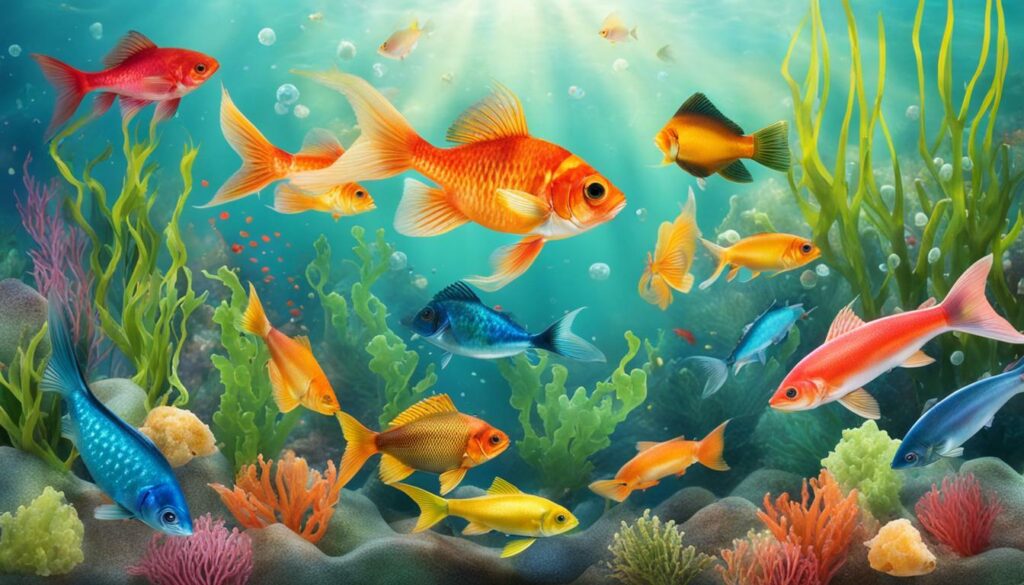Proper nutrition is essential for maintaining the overall health and well-being of your fish. Just like humans, fish require a balanced diet to thrive and stay healthy. Providing your fish with the right nutrients not only promotes their growth and vitality but also contributes to a healthier aquarium environment.
In this section, we will explore the importance of fish nutrition and how it can benefit your aquatic pets. From understanding their dietary needs to choosing the right fish food and supplements, we will provide you with valuable insights to ensure that your fish receive optimal nutrition for their well-being.
Key Takeaways:
- Proper nutrition is crucial for the health and well-being of fish.
- Providing the right nutrients contributes to a healthier aquarium environment.
- Understanding fish dietary needs and choosing the right fish food is essential.
- Supplements can enhance the health and vitality of your fish.
- Maintaining water quality is vital for the overall health of your fish.
Understanding Fish Nutrition: A Comprehensive Guide
Providing a well-balanced diet and proper supplements is crucial for meeting the nutritional needs of your fish. Just like humans, fish require a variety of nutrients to thrive and maintain optimal health. Understanding their diet requirements and ensuring they receive the necessary nutrients is essential for their overall well-being.
When it comes to fish nutrition, a key component is their diet. Different species have different dietary needs, so it’s important to research and understand what your specific fish requires. Some fish are herbivores and need a diet rich in plant-based foods, while others are carnivorous and thrive on a diet of protein-rich sources.
Supplements can also play a role in fish nutrition. They can provide additional nutrients that may be lacking in their primary diet. For example, Omega-3 fatty acids are essential for fish health, and supplements can help ensure they are receiving an adequate amount. However, it’s important to note that regular fish consumption is more effective than Omega-3 supplements in providing essential nutrients.

Water quality is another crucial factor in fish nutrition. Poor water quality can negatively impact fish health and hinder their ability to absorb nutrients. Maintaining proper filtration, temperature control, and water chemistry is essential for creating a healthy environment for your fish to thrive.
Key Takeaways:
- Providing a well-balanced diet and proper supplements is crucial for meeting the nutritional needs of your fish.
- Research the specific dietary needs of your fish species to ensure they receive the proper nutrition.
- Supplements can help provide additional nutrients, but regular fish consumption is more effective.
- Maintaining proper water quality is essential for fish health and nutrient absorption.
| Fish Nutrition Tips: |
|---|
| 1. Research the dietary needs of your specific fish species. |
| 2. Provide a well-balanced diet that includes a variety of foods. |
| 3. Consider supplementing with Omega-3 fatty acids if necessary. |
| 4. Maintain proper water quality through filtration and regular water testing. |
“Providing a well-balanced diet and proper supplements is crucial for meeting the nutritional needs of your fish.”
By understanding fish nutrition and providing the right diet, supplements, and water quality, you can ensure the health and vitality of your fish. Prioritizing their nutritional needs will contribute to a healthier and thriving aquarium environment.
Essential Nutrients for Fish Health
Just like humans, fish require a wide range of essential nutrients to maintain optimal health. These nutrients play a crucial role in their growth, development, immune function, and overall well-being. Understanding the key nutrients that contribute to fish health is essential for providing them with a balanced and nutritious diet.
Vitamins: Fish, like humans, rely on vitamins for various physiological processes. Vitamins A, D, E, and K are fat-soluble vitamins essential for vision, bone health, antioxidant protection, and blood clotting, respectively. On the other hand, vitamins C and B-complex are water-soluble vitamins that support immune function, energy metabolism, and overall cellular health.
Minerals: Minerals are vital for fish health, contributing to bone formation, enzyme activation, osmoregulation, and various metabolic processes. Calcium, phosphorus, and magnesium are essential minerals required for skeletal development, while potassium and sodium are crucial for maintaining proper fluid balance and nerve function. Trace minerals like iron, zinc, and copper play important roles as cofactors in enzymatic reactions and in supporting immune system function.
| Nutrient | Function | Sources |
|---|---|---|
| Vitamins | Essential for various physiological processes, such as vision, bone health, immune function, and antioxidant protection | Fresh fruits and vegetables, algae, and fortified fish foods |
| Minerals | Required for skeletal development, enzyme activation, osmoregulation, and metabolic processes | Fish foods, water, and natural sources like algae, shells, and rocks |
Protein and Amino Acids: Protein is a fundamental nutrient for fish, serving as the building blocks for tissues, enzymes, and hormones. Essential amino acids, which cannot be produced by the fish themselves, must be obtained through their diet. Amino acids like lysine, methionine, and tryptophan are crucial for growth, reproduction, and immune function. Fish foods rich in high-quality proteins, such as fish meal, shrimp, and krill, can ensure the proper intake of these essential nutrients.
To maintain fish health, it is essential to provide a diet that contains a balance of these essential nutrients. Consult with a fish nutrition expert or veterinarian to determine the specific dietary needs of your fish species and ensure they receive the right combination of vitamins, minerals, and proteins for optimal health and vitality.
Quote:
“Proper nutrition is the foundation of fish health. Providing a well-balanced diet with essential nutrients is crucial for their growth, vitality, and resistance to diseases.” – Fish Nutrition Expert
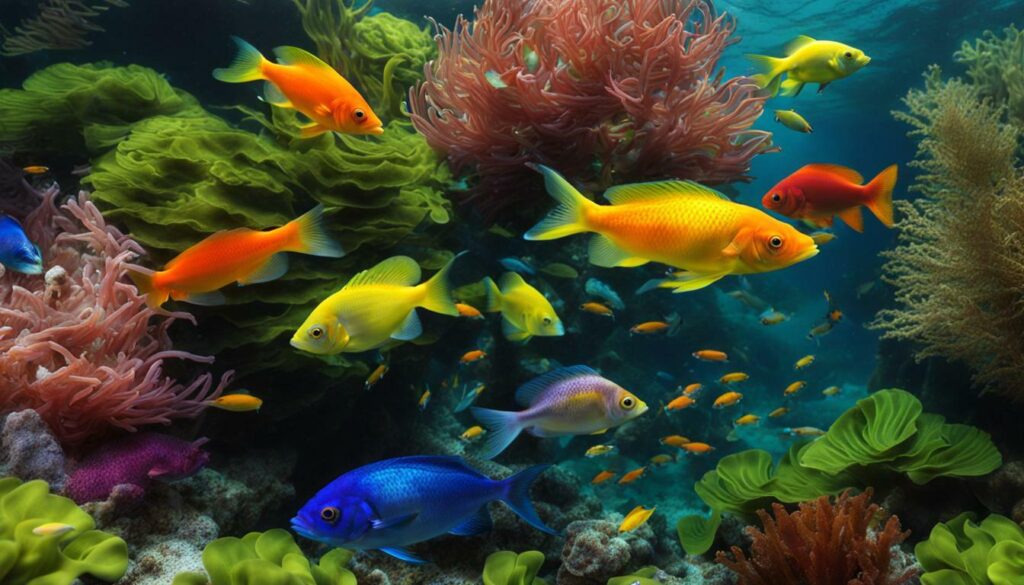
Selecting the appropriate fish food is essential for meeting the dietary requirements of your specific fish species. Fish, like humans, have diverse nutritional needs that must be fulfilled to maintain optimal health and vitality. By providing a well-balanced diet, you can ensure that your fish receive the necessary nutrients for growth, vibrant colors, and disease resistance.
When choosing fish food, it’s crucial to consider the natural feeding habits of your fish. Some species are herbivores and require plant-based food, while others are carnivores and thrive on a diet rich in proteins. Research the dietary preferences of your fish to select the most suitable food options.
To provide a varied diet, consider incorporating both dry and frozen food into your fish’s feeding routine. Dry food, such as pellets or flakes, is convenient and can provide essential nutrients. Frozen food, on the other hand, offers a more natural and diverse selection, mimicking the fish’s natural diet. It can include brine shrimp, bloodworms, or krill.
Remember that overfeeding can be detrimental to your fish’s health. Fish should be fed in small portions that they can consume within a few minutes. Excess food can lead to water pollution and may cause health issues. Monitoring your fish’s feeding habits and adjusting the portion size accordingly is vital for their well-being.
The Importance of Quality Ingredients
When selecting fish food, it’s essential to look for quality ingredients. High-quality fish food should list the specific ingredients, rather than generic terms like “fish meal” or “animal protein.” It should also contain a balance of proteins, fats, vitamins, and minerals to fulfill your fish’s dietary needs.
Additionally, consider the potential benefits of adding supplements to your fish’s diet. These supplements can provide essential vitamins and minerals that may be lacking in their primary food source. However, consult with a marine biologist or an experienced aquarist to determine if your fish requires supplements and the appropriate dosage.
In conclusion, choosing the right fish food is crucial for meeting the dietary needs of your fish. By providing a well-balanced diet, incorporating both dry and frozen food, and monitoring portion sizes, you can ensure the health and vitality of your fish. Remember to consider the natural feeding habits of your fish species and opt for high-quality ingredients to support their overall well-being. With proper nutrition, your fish will thrive in your aquarium, exhibiting vibrant colors and strong immune systems.
Understanding Fish Supplements
Fish supplements can provide additional nutritional support and help optimize the health of your fish. Just like humans, fish require a balanced diet to thrive and maintain good health. While their primary source of nutrition comes from their regular diet, supplements can play a valuable role in enhancing their overall well-being.
Fish supplements offer a convenient way to ensure that your fish receive essential nutrients that may be lacking in their regular diet. These supplements are specifically designed to meet the unique dietary needs of different fish species, providing a targeted boost of vitamins, minerals, and other vital components.
One common type of fish supplement is omega-3 fatty acids, which are known for their numerous health benefits. These fatty acids support cardiovascular health, reduce inflammation, and promote optimal brain function. Including omega-3 supplements in your fish’s diet can help enhance their overall health and vitality.
When selecting fish supplements, it’s important to choose high-quality products from reputable brands. Look for supplements that contain natural ingredients and are free from harmful additives or fillers. Additionally, consult with a knowledgeable fish specialist or veterinarian to determine the specific nutritional needs of your fish and find the most suitable supplements for them.

| Benefits of Fish Supplements | Common Types of Fish Supplements |
|---|---|
|
|
Remember that fish supplements should be used as a complement to a balanced diet, not a replacement. Providing your fish with a varied and nutritious diet, along with the appropriate supplements, will contribute to their overall health and longevity. Regularly monitoring your fish’s health and consulting with experts will ensure that you are meeting their specific nutritional needs.
Incorporating fish supplements into your fish’s daily feeding routine
1. Research the dietary requirements of your fish species and identify any potential nutritional gaps.
2. Choose high-quality fish supplements that are tailored to your fish’s needs and recommended by experts.
3. Introduce the supplements gradually, following the recommended dosage guidelines provided by the manufacturer.
4. Monitor your fish’s response to the supplements and adjust the dosage if necessary.
5. Combine the supplements with a balanced diet consisting of high-quality fish food and a variety of appropriate fresh or frozen foods.
6. Regularly assess your fish’s overall health and consult with a fish specialist or veterinarian to ensure their dietary needs are being met.
Improving Water Quality for Fish Health
Clean and well-maintained water is vital for the health and thriving of your fish. Proper water quality ensures that your fish receive the necessary oxygen, nutrients, and a suitable environment to flourish. In addition, maintaining optimal water conditions helps prevent diseases and stress, ultimately promoting the overall well-being of your aquatic pets.
One crucial aspect of water quality management is regular filtration. An effective filtration system helps remove debris, excess food, and waste products from the aquarium, ensuring clean water for your fish. Additionally, monitoring and maintaining appropriate water temperature and pH levels are essential. Different fish species have specific temperature and pH range preferences, so it’s crucial to research and cater to their individual needs.
To further enhance water quality, consider adding live plants to your aquarium. Plants play a significant role in removing excess nutrients and reducing harmful levels of ammonia and nitrate, creating a more stable and healthy environment for your fish. Additionally, plants provide hiding spots and a sense of security for your fish, reducing stress and promoting their overall well-being.
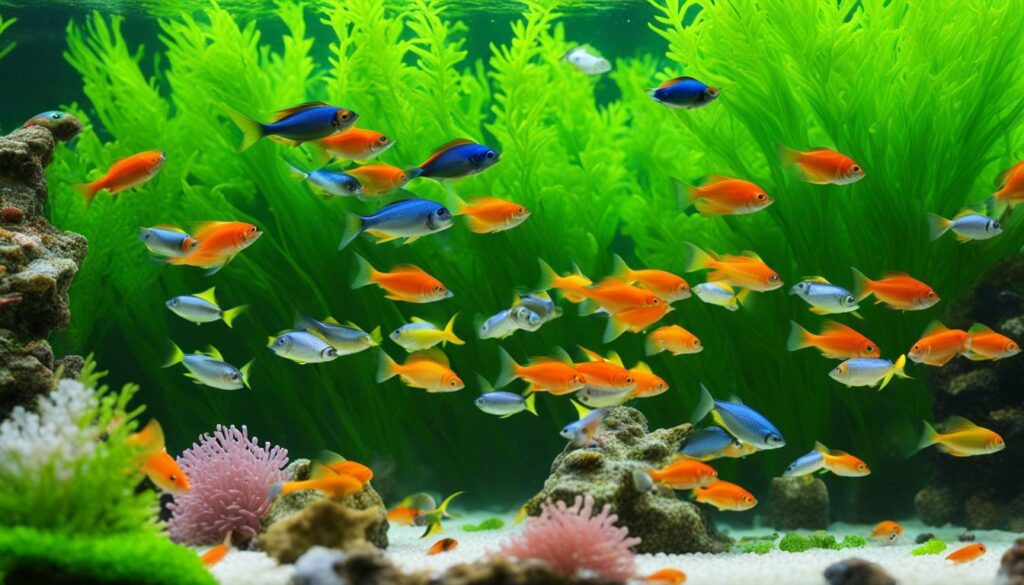
Regular testing of water parameters is essential to ensure optimal conditions for your fish. Test kits are readily available and can help you monitor levels of ammonia, nitrate, nitrite, pH, and other crucial indicators. By regularly testing and maintaining proper water quality, you can prevent potential problems and create a thriving and vibrant aquatic ecosystem for your fish to enjoy.
Remember, clean and well-maintained water is the foundation of fish health. By prioritizing water quality and implementing appropriate measures, you can provide your fish with the ideal environment for growth, vitality, and overall well-being.
Implementing proper feeding techniques is essential to ensure your fish receive the necessary nutrients for their well-being. It is important to understand the dietary needs of your fish and provide them with a balanced and nutritious diet. Feeding your fish the right food in the right amounts will promote their growth, enhance their immune system, and improve their overall health.
When it comes to feeding your fish, there are a few key techniques to keep in mind. Firstly, it is important to feed your fish the appropriate amount of food. Overfeeding can lead to poor water quality and health problems for your fish. A general rule of thumb is to feed your fish small amounts of food 2-3 times a day, only giving them what they can consume in a few minutes.
Secondly, it is crucial to choose the right type of food for your fish. Different species of fish have different dietary needs, so it is important to do some research or consult with a professional to determine the best food for your specific fish. There are a variety of options available, including flakes, pellets, and frozen or live foods. Consider the natural feeding habits of your fish when choosing their food, as some species may require live or frozen foods to meet their dietary needs.
Lastly, supplementing your fish’s diet can be beneficial in promoting their overall health. There are specific supplements available that can provide additional vitamins and minerals that may be lacking in their regular diet. However, it is important to consult with a professional before introducing any supplements to ensure they are appropriate for your fish.
In conclusion, proper feeding techniques are essential for the optimal nutrition and well-being of your fish. By understanding the dietary needs of your fish, choosing the right food, and implementing the appropriate feeding schedule, you can ensure that your fish are healthy and thriving in your aquarium.
Feeding Tips and Tricks
To further enhance the feeding process, here are some helpful tips and tricks to consider:
- Observe your fish: Pay attention to your fish’s behavior during feeding time. This will give you an indication of their appetite and help you adjust the amount of food you provide.
- Rotate their diet: Just like humans, fish can get bored with the same food every day. Consider rotating their diet by providing a variety of foods to keep them stimulated and interested.
- Avoid overfeeding: Overfeeding can lead to obesity, poor water quality, and health issues. Remember to feed your fish small amounts at a time and remove any uneaten food from the tank.
- Monitor water quality: Proper water quality is vital for the health of your fish. Regularly test the water parameters and conduct water changes as needed to maintain a clean and healthy environment for your fish.
Remember, a well-fed fish is a healthy fish. By implementing proper feeding techniques and providing a nutritious diet, you can ensure that your fish thrive and have a long and healthy life.
| Common Fish Feeding Mistakes | How to Avoid Them |
|---|---|
| Overfeeding | Feed small amounts at a time and remove any uneaten food |
| Feeding Incompatible Foods | Research the dietary needs of your specific fish species and provide appropriate food |
| Feeding at Incorrect Times | Establish a regular feeding schedule that aligns with your fish’s natural feeding habits |
Implementing proper feeding techniques is essential to ensure your fish receive the necessary nutrients for their well-being. By understanding their dietary needs, selecting the right food, and following these tips, you can promote the health and vitality of your fish. Remember, a well-fed fish is a happy fish!

Creating a conducive environment and practicing good fish care habits are crucial for promoting optimal health in your aquarium. By ensuring the right conditions and providing proper care, you can enhance the well-being of your fish and prevent common health issues. Here are some best practices to follow:
1. Maintain a Clean and Balanced Environment
Regularly clean your aquarium by removing debris, uneaten food, and waste. This helps maintain water quality and prevents the buildup of harmful substances. Regular water changes are essential to remove toxins and maintain proper pH levels. Use a reliable water testing kit to monitor ammonia, nitrite, and nitrate levels, as well as pH and temperature. This will help you identify and rectify any imbalances in the water parameters.
2. Provide a Well-Balanced Diet
Offer a variety of high-quality fish food that meets the specific dietary needs of your fish. Different species have different nutritional requirements, so it’s essential to research and provide a well-balanced diet. Include a mix of dry and frozen foods to ensure a diverse range of nutrients. Avoid overfeeding, as excess food can lead to poor water quality and health problems. Feed your fish small portions multiple times a day, rather than one large feeding.
3. Monitor Behavior and Health
Regularly observe your fish for any signs of stress, disease, or abnormal behavior. Look out for changes in appetite, coloration, swimming patterns, or unusual growths. Identifying and addressing any potential health issues early can prevent them from worsening and affecting the overall health of your fish. Consult a veterinarian or a knowledgeable fish expert if you notice any concerning symptoms.
Remember, each fish species has unique care requirements, so always research and understand the specific needs of your fish. By implementing these best practices, you can create a healthy and thriving environment for your aquatic pets.
| Best Practices for Fish Care and Health |
|---|
| Maintain a Clean and Balanced Environment |
| Provide a Well-Balanced Diet |
| Monitor Behavior and Health |
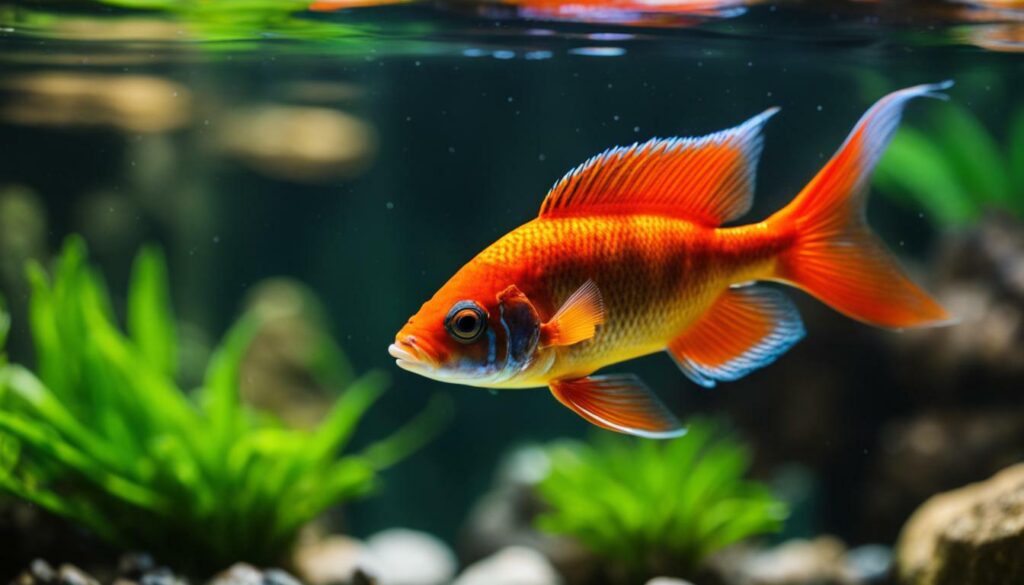
“Regularly clean your aquarium by removing debris, uneaten food, and waste. This helps maintain water quality and prevents the buildup of harmful substances.”
- Regularly clean your aquarium to maintain water quality
- Perform regular water changes to remove toxins
- Monitor water parameters using a testing kit
“Offer a variety of high-quality fish food that meets the specific dietary needs of your fish. Different species have different nutritional requirements, so it’s essential to research and provide a well-balanced diet.”
- Research the dietary needs of your fish species
- Provide a mix of dry and frozen foods
- Avoid overfeeding and feed small portions multiple times a day
“Regularly observe your fish for any signs of stress, disease, or abnormal behavior.”
- Regularly observe your fish for changes in appetite, coloration, or swimming patterns
- Address any potential health issues early
- Consult a veterinarian or fish expert if needed
Fish Nutrition and Human Health
Consuming fish and fishery products not only benefits fish health but also plays a significant role in improving human health. Fish and fishery products are essential for food and nutritional security, providing high-value proteins and unique micronutrients. One of the key nutrients found in fish is long-chain omega-3 fatty acids, including eicosapentaenoic acid (EPA) and docosahexaenoic acid (DHA). These fatty acids are crucial for optimal brain development in children and can lower the risk of coronary heart disease in adults.
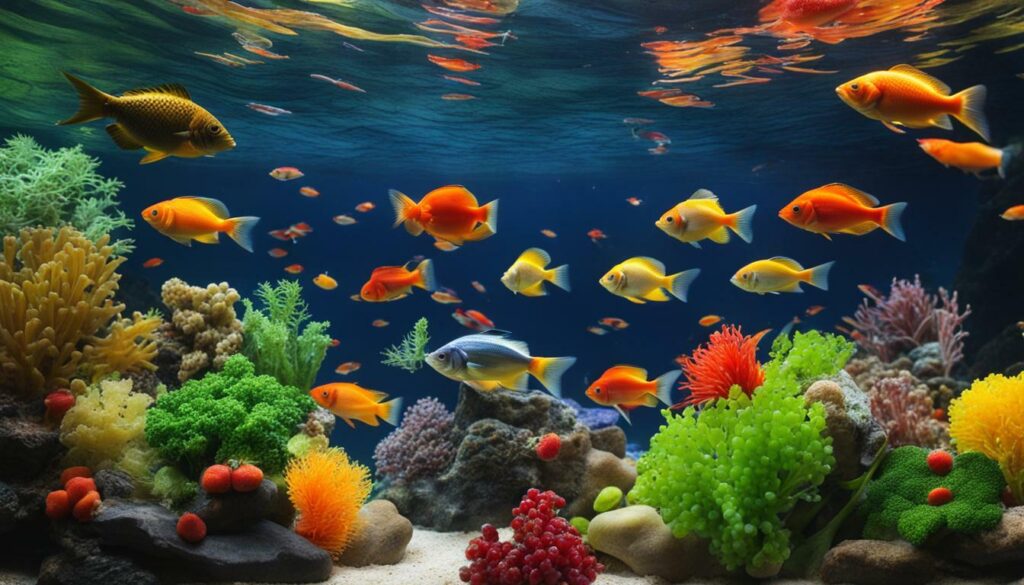
The demand for fish is expected to increase with the growing population, and aquaculture is seen as a sustainable way to meet this demand. Farmed fish, such as carp and tilapia, are good sources of omega-3 fatty acids, and their consumption plays a significant role in food and nutrition security in many Asian countries. Small pelagic fish, such as sardines and anchovies, are also affordable and rich sources of omega-3s.
Regular consumption of fish is more effective than taking omega-3 supplements in providing essential nutrients and omega-3 fatty acids. Fish and fishery products are not only a valuable source of nutrition but also contribute to overall health and well-being. By incorporating fish into your diet, you can enjoy the benefits of these essential nutrients and support both your own health and the health of the fish in your aquarium.
The Benefits of Omega-3 Fatty Acids
- Optimal brain development in children
- Reduced risk of coronary heart disease in adults
- Improved food and nutrition security
- Source of essential nutrients
- Supports overall health and well-being
Choosing the Right Fish
When selecting fish for consumption, it’s important to consider sustainability and the impact on fishery resources. Choosing fish species that are abundant and well-managed can help ensure the long-term availability of healthful fish products. Additionally, incorporating a variety of different fish species into your diet can provide a broader range of essential nutrients.
| Fish Species | Omega-3 Fatty Acid Content |
|---|---|
| Sardines | 2,205 mg per 100g |
| Salmon | 1,244 mg per 100g |
| Tuna | 228 mg per 100g |
| Trout | 1,244 mg per 100g |
By prioritizing fish nutrition in your diet, you can enjoy the numerous health benefits of omega-3 fatty acids while also contributing to the well-being of fish and sustainable practices in the aquaculture industry.
Sustainable Practices in Fish Nutrition
Adopting sustainable practices in fish nutrition is crucial to meet the increasing demand for fish in a responsible and efficient manner. Fish and fishery products are essential for food and nutritional security, providing high-value proteins and unique micronutrients. They are a valuable source of nutrition, playing a vital role in boosting the health of fish and humans alike. To ensure the availability of healthful fish products and protect fishery resources, sustainable practices must be implemented throughout the aquaculture industry.
Improved utilization of fishery resources is an important aspect of sustainable fish nutrition. This involves responsible fishing practices and reducing waste. Small pelagic fish like sardines and anchovies, for example, are affordable and rich sources of omega-3 fatty acids. By focusing on these small fish, which often have high population growth rates, we can help maintain a healthy balance in marine ecosystems while meeting the demand for essential nutrients.
Reducing post-harvest losses is another key factor in sustainable fish nutrition. Implementing proper handling and storage techniques helps prevent spoilage and maximizes the utilization of harvested fish. This reduces waste and ensures that the full nutritional value of the fish is retained. By optimizing post-harvest practices, we can minimize the environmental impact of fish production and contribute to a more sustainable future.
| Sustainable Practices in Fish Nutrition | Benefits |
|---|---|
| Utilization of small pelagic fish | Affordable and rich sources of omega-3 fatty acids |
| Reducing post-harvest losses | Maximizes utilization and minimizes waste |
| Utilization of fishery by-products | Reduces waste and increases resource efficiency |
Furthermore, the use of fishery by-products can contribute to sustainability in fish nutrition. By utilizing all parts of the fish, including offal and trimmings, we can reduce waste and increase resource efficiency. These by-products can be processed into valuable ingredients for fish feed, such as fish meal and fish oil. This not only reduces the demand for wild fish as feed ingredients but also helps close the nutrient loop within the aquaculture system.

Adopting sustainable practices in fish nutrition is not only essential for meeting the increasing demand for fish but also for preserving our oceans and ensuring the long-term health of both fish and humans. By utilizing fishery resources responsibly, reducing post-harvest losses, and making use of by-products, we can contribute to a more sustainable and resilient aquaculture industry. Let us prioritize sustainable fish nutrition to safeguard the future of our oceans and the well-being of all.
Conclusion: Prioritizing Fish Nutrition for a Healthier Aquarium
By prioritizing fish nutrition and providing the necessary dietary needs, you can ensure the health and vitality of your fish and create a stunning aquarium display. Fish and fishery products are not only essential for food and nutritional security but also play a vital role in boosting the overall health of both fish and humans.
Fish, such as carp and tilapia, are excellent sources of the long-chain omega-3 fatty acids EPA and DHA, which are crucial for optimal brain development in children and can lower the risk of coronary heart disease in adults. Regular consumption of fish, especially small pelagic fish like sardines and anchovies, provides essential nutrients and omega-3 fatty acids more effectively than omega-3 supplements.
Aquaculture is expected to meet the growing demand for fish, and improved utilization of fishery resources, reduction of post-harvest losses, and the use of by-products can further contribute to providing healthful fish products. With proper feeding techniques and the right fish food, you can ensure that your fish receive all the essential nutrients they need for growth, health, and vitality.
Furthermore, maintaining proper water quality, including filtration, temperature control, and water chemistry, is crucial for the overall well-being of your fish. By following best practices for fish care, including tank maintenance, stress reduction, and disease prevention, you can create an environment that promotes the health and longevity of your fish.
Ultimately, prioritizing fish nutrition not only benefits your aquatic companions but also enhances the visual appeal of your aquarium. So, make sure to provide your fish with a balanced diet, proper supplementation if necessary, and a well-maintained habitat to support their health and well-being.
FAQ
Q: What are the benefits of fish and fishery products?
A: Fish and fishery products are essential for food and nutritional security, providing high-value proteins and unique micronutrients. They are rich sources of long-chain omega-3 fatty acids, which are crucial for optimal brain development in children and can lower the risk of coronary heart disease in adults.
Q: Which fish are good sources of omega-3 fatty acids?
A: Farmed fish like carp, tilapia, sardines, and anchovies are good sources of omega-3 fatty acids. Regular consumption of these fish plays a significant role in food and nutrition security, particularly in many Asian countries.
Q: Are omega-3 supplements as effective as regular fish consumption?
A: No, regular fish consumption is more effective in providing essential nutrients and omega-3 fatty acids than omega-3 supplements. Fish contain a wider range of nutrients and offer better absorption and utilization by the body.
Q: How can fishery resources be utilized more effectively?
A: Improved utilization of fishery resources, reduction of post-harvest losses, and the use of by-products can contribute to meeting the demand for healthful fish products while minimizing waste.
Q: Why is water quality important for fish health?
A: Maintaining proper water quality is crucial for the overall health and well-being of fish. It includes considerations for filtration, temperature control, and water chemistry to provide a suitable environment for fish to thrive in.
Q: How can I choose the right fish food?
A: When choosing fish food, consider the specific dietary needs of your fish, including their species and natural feeding habits. It is important to provide a balanced diet that meets their nutritional requirements.
Q: What role do supplements play in fish nutrition?
A: Supplements can enhance the health and vitality of your fish by providing additional nutrients that may be lacking in their diet. Different types of supplements are available to address specific nutritional needs.
Q: How can I feed my fish for optimal nutrition?
A: To ensure your fish receive optimal nutrition, feed them according to their dietary needs, taking into account factors such as the size of the fish, their feeding habits, and the amount of food they can consume in a single feeding.
Q: What are the best practices for fish care and health?
A: Best practices for fish care and health include maintaining proper tank maintenance, reducing stress, and preventing disease. Regular monitoring, water changes, and providing a suitable habitat are essential for their well-being.
Q: How does fish nutrition impact human health?
A: Fish nutrition, particularly the omega-3 fatty acids found in fish, plays a role in human health. Omega-3s are crucial for brain development in children and can help reduce the risk of coronary heart disease in adults.
Q: How can sustainable practices be implemented in fish nutrition?
A: Sustainable practices in fish nutrition include utilizing fishery resources efficiently, reducing post-harvest losses, and finding uses for by-products. These practices help meet the growing demand for healthful fish products while minimizing waste.


